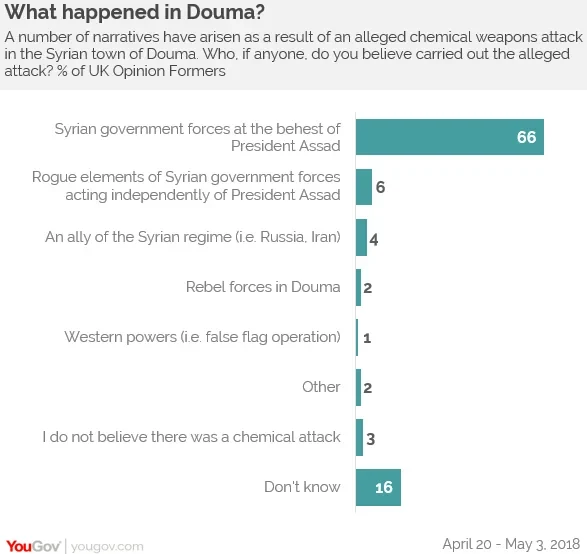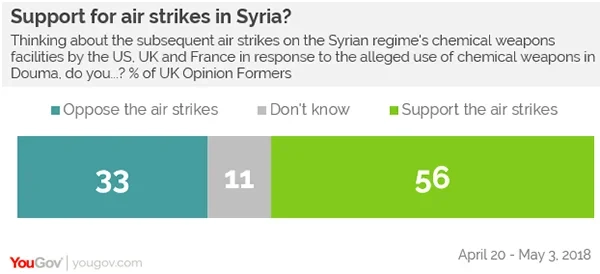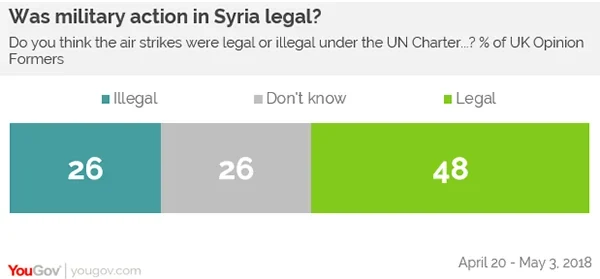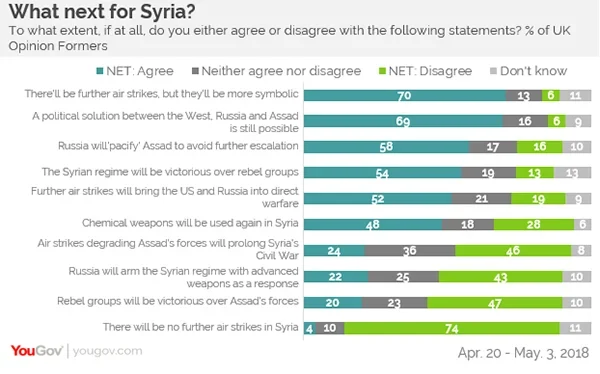While the World waits for the results of the Organisation for the Prohibition of Chemical Weapons’ (OPCW) probe into the alleged poison gas attack in Douma in April, YouGov asked its Opinion Formers panel, which draws leaders from the worlds of business, politics, the media, charities, public sector and academia among others, what they believe really happened.

Two-thirds of UK Opinion Formers (66%) believe that the alleged gas attack did occur and that it was ordered by President Bashar al-Assad. However, 6% believe that while gas was used by Syrian government forces, they did so independently of President Assad. A further 4% believe that one of Syria’s allies was responsible, while 3% believe some sort of conspiracy may have occurred, either the gas having been deployed by the rebel forces in Douma themselves (2%) or that the West carried out the attack (1%). While a further 3% do not believe any chemical attack occurred, a sizeable minority of 16% just don’t know what narrative to believe.

Days after the alleged attack and a heated debate at the UN, the US, UK and France launched a series of air strikes against sites identified as the Syrian regime’s chemical weapons facilities. In retrospect, 56% of Opinion Formers support the strikes, compared to 33% who oppose military action.

With regard to the actual legality of the strikes, fewer than half (48%) believe they were legal under international law, codified in the UN Charter. Conversely, a quarter (26%) believe the strikes were illegal.

Despite the legal wrangling, seven-in-ten (70%) are sure that further air strikes will take place, but that they’ll be more symbolic rather than degrading the regime. Over half (52%) think that any further air strikes will bring the US and Russia into direct warfare and possible escalation outside Syria’s borders.
On the other hand however, while the strikes might not have caused Assad’s regime any real damage it did show the West’s willingness to call Russia’s bluff after heated rhetoric at the UN. According to Opinion Formers, this could force Russia to ‘pacify’ Assad in order to avoid any further escalation (58%). And yet, just under half feel the air strikes won’t deter chemical weapons use in Syria, with 48% believing they’ll be used again.
Indeed, air strikes seem at best a punitive option that are unlikely to make any difference to what is looking increasingly like an Assad victory in the Syrian Civil War. Over half (54%) believe the regime will emerge victorious over the rebel groups, and, perhaps in a bitter-sweet twist, 69% are hopeful that a political solution involving the West, Russia and Assad’s regime can still be reached.
YouGov completed online interviews with 734 opinion formers from its UK Opinion Formers Panel. Opinion Formers are leaders in their field from business, media, politics, NGOs, academia and beyond. Fieldwork was undertaken between 20th April and 3rd May 2018. The figures have not been weighted.
Image Getty









